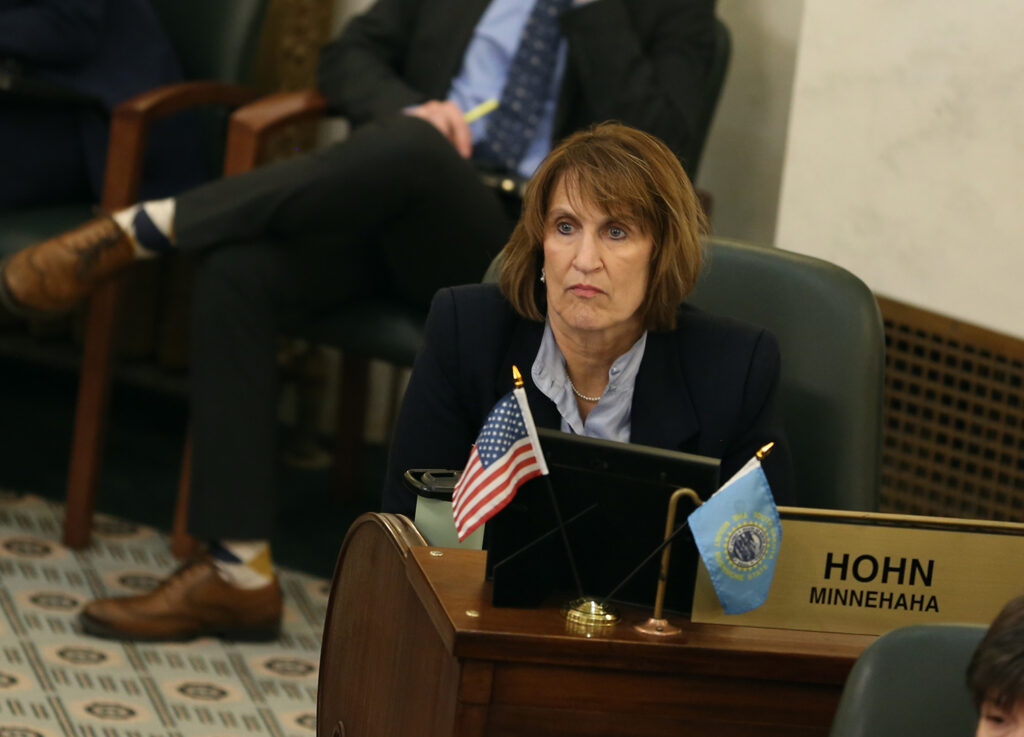
State Sen. Joy Hohn, R-Hartford, listens to debate on the South Dakota Senate floor on Feb. 10, 2025. (John Hult/South Dakota Searchlight)
Over 100 state and local officials from the Midwest and West, including South Dakota, are asking the U.S. Senate to eliminate tax credits for carbon capture and sequestration as part of a federal budget reconciliation bill.
Established by Congress and then-President George W. Bush in 2008, the 45Q tax credits incentivize companies to capture carbon dioxide from processes such as ethanol production and sequester it underground, so it won’t contribute to climate change by acting as a greenhouse gas in the atmosphere. The carbon can also be sequestered as part of enhanced oil recovery, in which pressurized gas is used to push more oil to the surface.
Opponents say the credits don’t work as intended.
“The 45Q tax credits really only make sense to the industries that are poised to make billions of dollars from them,” said North Dakota state Sen. Tim Mathern, D-Fargo. “They are supposedly intended to reduce carbon emissions, but in fact, 45Q tax credits pay polluters for polluting and subsidize private oil production at the expense of the taxpayer.”
South Dakota regulators deny carbon pipeline permit again, but company vows to reapply
Companies receive up to $85 per metric ton for regular sequestration and up to $60 per metric ton for sequestration via enhanced oil recovery — though there is a provision in a draft portion of the Senate reconciliation bill that would raise the maximum oil recovery credit to $85.
The repeal effort includes officials from Colorado, Indiana, Iowa, Montana, New Mexico, North Dakota, South Dakota and Wyoming. A few of those officials held a virtual press conference Wednesday.
South Dakota state Sen. Joy Hohn, R-Hartford, described the tax credits as wasteful spending.
“We are concerned about preserving taxpayer dollars, and I guess that’s the main gist of our conference today,” Hohn said.
Mathern said repealing the tax credits would put projects like Summit Carbon Solutions’ proposed five-state carbon dioxide pipeline “in dire danger.”
“And that’s really positive,” he said.
Summit’s project alone could qualify for more than $1 billion annually from 45Q credits. It aims to capture some of the CO2 emitted by dozens of ethanol plants and ship the carbon via pipeline to a sequestration area southeast of the oilfields in western North Dakota.
Earlier this year, South Dakota’s legislators and governor adopted a law banning the use of a legal process known as eminent domain to acquire land access for carbon dioxide pipelines. South Dakota regulators also rejected Summit’s project application, saying there was no path forward for the project under the eminent domain ban.
Those moves came after several years of anti-pipeline activism by landowners focused on property rights and the danger from potential leaks of toxic carbon dioxide plumes. The project has permits in other states, but some of those are being challenged in court.
GET THE MORNING HEADLINES.
Congressional Republicans are using the complex reconciliation process to move a budget package through Congress with simple majority votes in each chamber, avoiding the Senate’s 60-vote legislative filibuster. The House recently passed its version of the bill without a repeal of the 45Q tax credits. U.S. Rep. Dusty Johnson, R-South Dakota, voted for the bill.
A spokesperson for Johnson sent a statement when asked via email if the congressman supports repealing the tax credits: “While Dusty wished the reconciliation bill was more conservative, he voted in favor of it when it passed the House. We’ll see what the Senate passes.”
A spokesperson for U.S. Sen. Mike Rounds, R-South Dakota, said Rounds met with a group of South Dakota lawmakers when they traveled to D.C. to voice opposition to the 45Q tax credits.
“Senator Rounds has long held the belief that many industry specific tax credits should not be perpetual, a belief which this group of landowners shares,” the statement said. “However, he has not had a chance to hear details of President Trump’s interest in this program. While many in South Dakota may oppose 45Q, it has been a popular proposal for other states for almost two decades and was included in the House-passed reconciliation bill.”
The office of Senate Majority Leader John Thune, R-South Dakota, did not respond to South Dakota Searchlight’s request for his position.


